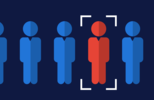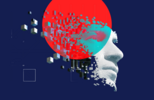Digitalization and HR – a dream team

The foundations are there. In the future, HR will also be responsible for personnel planning, recruitment and staff communication. But that won’t be all! There are fewer administrative tasks, as new technologies take care of these. According to estimates, routine tasks might only make up 15 to 25 percent of HR work in the future.
This means the role of these staff members will change considerably. Although this move toward digitalization has been ongoing for years, the current explosion of working from home and digital forms of collaboration has hugely accelerated the process. In uncertain times such as these, HR specialists are becoming designers, enablers and strategists. They make remote working – and everything that entails – possible, and ensure that staff can collaborate at least as effectively from home as they do in the office.
Navigating through turbulent times
These roles are important to ensure companies are able to navigate the current choppy waters as safely as possible, and keep going no matter how rough things get. In the future, a lot will depend on whether there is a strategic personnel plan in place and whether the HR department can make staff fit for their changing responsibilities. HR departments will only survive this whirlwind of change if they offer their staff training and working conditions that help motivate them.
New skills required
One more thing is clear, however. This will not all happen automatically and inevitably, just because the world is changing so radically. HR and the digital transformation will only turn into a dream team if the HR department itself changes. Personnel specialists absolutely require at least a basic understanding of technological expertise. How else will they be able to choose the suitable collaboration tools and useful HR software? How would you be able to judge which technology fits your strategy? HR specialists can’t leave these questions to IT professionals or the company management, because they reach deep into the heart of what their work is all about – collaboration, HR communication, evaluation, training, etc.
The future is here – digital HR departments
Highly developed software solutions that cover the entire HR spectrum form the basis for the profitable digitalization of your company. These solutions range from online recruiting and eLearning to digital personnel files. If you choose a helpful software solution, it can take your HR services to a whole new level and significantly lift the load of routine tasks from the HR team, enabling them to take on more strategic tasks.
Find the best using artificial intelligence
Take artificial intelligence (AI), for example. AI scours the internet for suitable applicants in next to no time, scanning resume databases, business networks such as LinkedIn, and social media sites including Facebook and Twitter – a research task that would be beyond any human capability.
Fast, efficient and broad-based
AI works for the HR department during the selection process, too – for example in preselecting applications or in the e-assessment center. HR software can evaluate the skills of applicants in mere seconds. It provides the HR specialists with a list sorted by skills, expertise, behavior and motivation. Decisions no longer have to be made based on gut feeling, but rather on a broad basis of data. Moreover, they can be made quickly since digitalization accelerates the processes hugely. This is a key factor when it comes to competing for specialist staff, as applicants frequently choose another company if the recruitment process takes too long, according to a Bitkom study.
Benefits of data-based planning
A wide range of data is available for digital HR planning, too. Real time analytics enables HR to establish a clear-cut overview of all the currently available data, resources and capacities, which opens up a fine degree of planning that would be unthinkable without digital support.
SAP SuccessFactors and eLearning
This offers an invaluable treasure trove of data for areas such as staff development – one of the key future trends. The HR department uses this to connect all talent and performance management activities with the company goals via SuccessFactors. A wide range of eLearning material is available to provide staff with tailored support and development opportunities. It is no wonder, then, that these digital possibilities are changing the way HR departments see themselves – in the best case, turning into a dream team.




